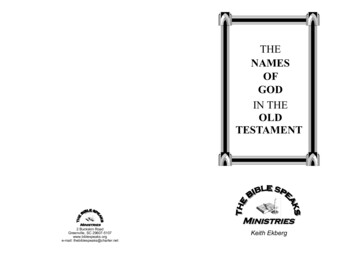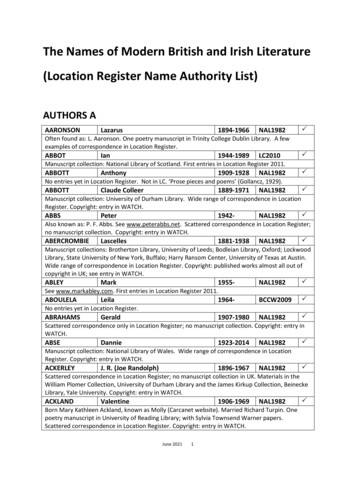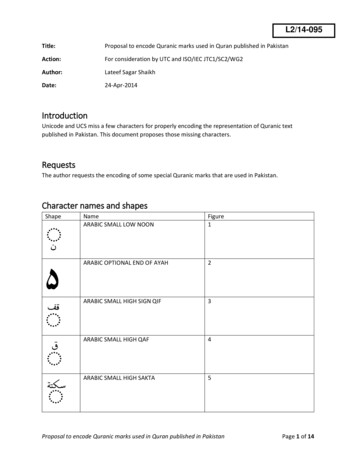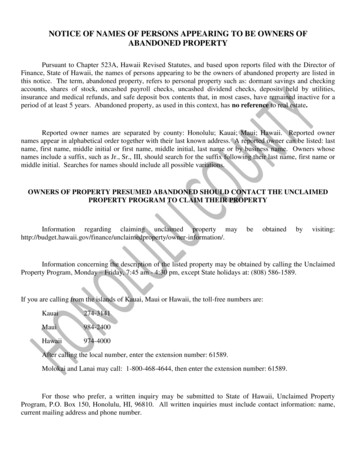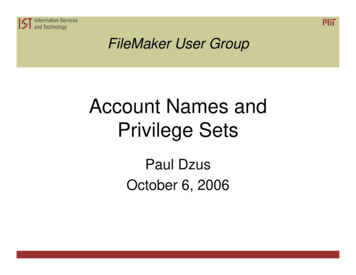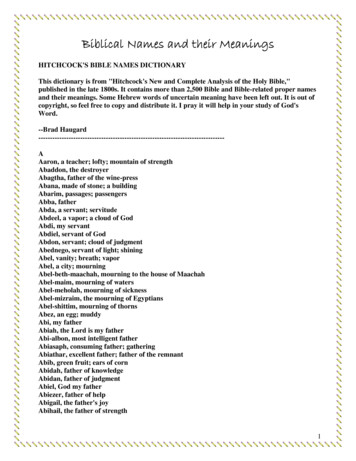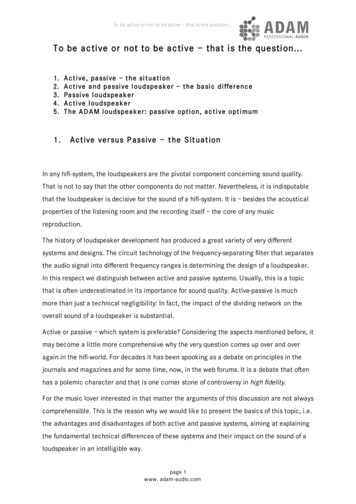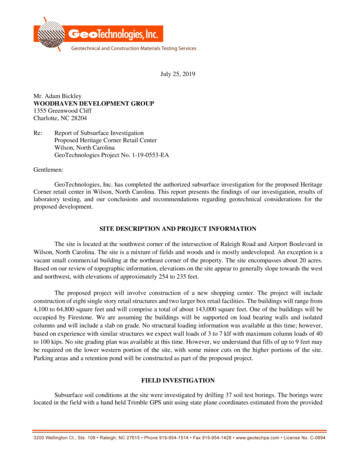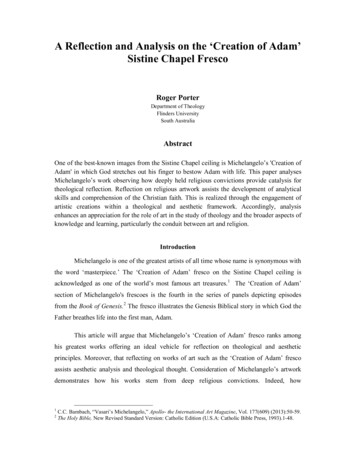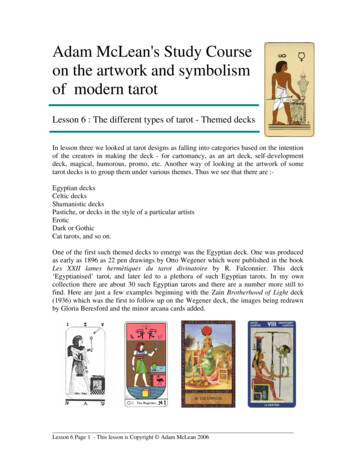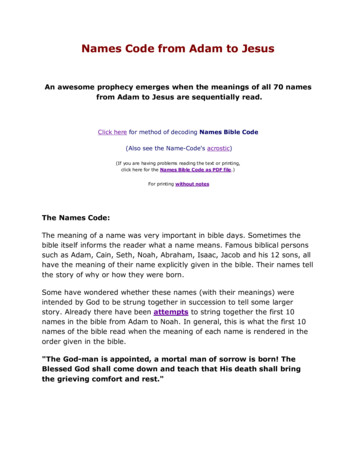
Transcription
Names Code from Adam to JesusAn awesome prophecy emerges when the meanings of all 70 namesfrom Adam to Jesus are sequentially read.Click here for method of decoding Names Bible Code(Also see the Name-Code's acrostic)(If you are having problems reading the text or printing,click here for the Names Bible Code as PDF file.)For printing without notesThe Names Code:The meaning of a name was very important in bible days. Sometimes thebible itself informs the reader what a name means. Famous biblical personssuch as Adam, Cain, Seth, Noah, Abraham, Isaac, Jacob and his 12 sons, allhave the meaning of their name explicitly given in the bible. Their names tellthe story of why or how they were born.Some have wondered whether these names (with their meanings) wereintended by God to be strung together in succession to tell some largerstory. Already there have been attempts to string together the first 10names in the bible from Adam to Noah. In general, this is what the first 10names of the bible read when the meaning of each name is rendered in theorder given in the bible."The God-man is appointed, a mortal man of sorrow is born! TheBlessed God shall come down and teach that His death shall bringthe grieving comfort and rest."
As we shall see, this astounding prophecy continues to read in the verysame way, using all 80 names in the genealogy of Jesus!The Acrostic:Another type of bible code has also been recently discovered. It occurswithin the first 20 names from Adam to Abraham, (27 names to Moses), andconfirms the names code. The first letter of each consecutive name fromAdam to Moses in the original Hebrew forms an acrostic. It is clear by thewhat this acrostic-prophecy says that the reading is meant to be affixed tothe Meaning-of-Names Code. (The acrostic will be examined separately inthe second part of this study.)
Simplified Rendering of theMeaning-of-Names from Adam to Christ(The literal reading follows after this with detailed notes on each name.)(The first two lines are the above acrostic.)"I will choose a circumcised people (i.e., Jews), even many peoplesfor myself (i.e., Gentiles).""I will forgive my enemies, having compassion, forgiving those madefrom the dust a second time."
(The first paragraph is Cain's line.)"The God-man is born, a teacher of fugitives! The One smitten byGod will be a mighty man of God! A river flows, O' offspring of theMan born!"The God-Man is appointed, a mortal man of sorrow is born! TheBlessed God shall come down from heaven and teach men that bymeans of His death He shall bring rest and comfort to those whomourn.The fame of the stronghold of Babylon, and sorrow, extend theirborders like a plant beyond the place of division (at the Tower ofBabel). -- But I will make Babylon fade away!A friend also branches out, enraged with fury!A glorious father, the father of a great multitude laughs as he outwits (his enemy). Arighteous prince sees God! A mighty one fights! {He joins himself to anassembly, a glorious people whom he rescued, stranger(s) in a strange land, captivesdelivered by God!"} See note for bracketed portion.One who praises the Lord breaks open a way into a safe place that issurrounded by a high wall.O' my people who belong to the prince, a prophet clothed withstrength and who serves (the Lord), is here! Out of love, thisbeloved one paid the price for peace in order to set the people free,bringing them into a spacious land.My Father is the Lord, the healer of him whom the Lord judged andthen raised up. The Lord has taken hold of me and the Lord is strong!Mighty is the Lord! My strength and help are in the Lord! The Lord isperfect! I took hold of the strength of the Lord and it made me forgetmy misery. Truly, (I am) the Master Builder whom the Lord Godhealed, whom the Lord raised up, whom the Lord upholds, diduphold and will uphold!
I have asked God about the ransomed of the Lord --- those exiled inBabylon. My Father is awesome! God will raise up a helper, the JustOne will the Lord raise up! God is my praise! God is the One whohelps. May the Gift of Jacob increase in greatness, for God is with us--- the Messiah and Savior of those called out (of Babylon).Note: In the above simplified rendering of the Meaning-of-Names-Code, the firstparagraph is the line of Cain who perished in Noah's flood. Remarkably, the godly andungodly up to Noah use similar or same names. This striking similarity is the logic behindinserting Cain's line alongside Seth's. However, for arguments sake, because Cain's linemerely affirms what the godly line to Noah already reads, thus, Cain's line can be omittedwith no loss to the code.The righteous line of Adam to Noah is listed after Cain's line and continues through to Jesusand His "Church". The word "Church" is listed as the last name in the genealogy because ina theological sense His Church, which was "born" just 50 days after Jesus died, caps off thegenealogy of Jesus. This is in agreement with Isaiah the prophet, ".he will see hisoffspring and prolong his days", (Isaiah 53:10 NIV).(Click here for the method of decoding the Names Bible Code.)The Literal Reading of NamesWe first present the more literal rendering of the Names Bible Codeusing these seven slides, followed by detailed notes for each name.
The Names Code with Notes for Each NameKing Amaziah (#39c) is the center of a complex bracketing-out of thought that movesforeword and backward from this center, typical of Hebrew poetry. The names have beencolor-coded accordingly. The names generally follow this pattern:It begins with #11 and ends with #61, with #1-10 as the introduction and summary and#51-61 also serving as a conclusion.edcbaAabcdeIncrease of famePraiseState of safety vs prayer for helpTrial, healing, resurrectionTaking hold of strength"Mighty is the Lord!"Taking hold of strengthTrial, healing, resurrectionState of safety vs prayer for helpPraiseIncrease of fame
Names follow the genealogy in the Gospel of Matthew (ch. 1),coupled with Gen. 5, Gen. 11, (Luke 3).Luke has 77 names ---the number of forgiveness --- from Jesus to Adam "the son ofGod". The names after David differ from that of Matthew's genealogy due to anothermethod of tracing the lineage of Jesus. Interestingly, these names recorded by Luke (from"David" on) do not form a names bible code as does Matthew's list, but when attemptedreads as gibberish. This only underscores the miracle of Matthew's list of names.Nor can it be said that Matthew deliberately invented these names in order to artificiallycreate this code because it is Matthew (not Luke) who follows the names of the kings ofJudah as recorded in the Old Testament centuries before Matthew was born. Only the last10 names in Matthew's genealogy are not found in the Old Testament. This is because theOld Testament ceased to be written during that period. Thus, only about one-eighth of thenames in the Names Bible Code are supplied to us by Matthew while the rest are alreadyfound in the Old Testament. Moreover, the 27-letter acrostic is also taken from the first 27names recorded in the Old Testament.And if we say that the numerous Old Testament writers somehow over a period of hundredsof years conspired to create the Names Code, then we are still left with a prophecy aboutJesus the Messiah written hundreds of years before he was born. How much more logical tosimply accept this code as a miracle of God!Matthew has 60 names from Adam to Jesus if we complete it back to Adam, and 65 if theextra 4 or 5 names are added that Matthew purposely left out for numeric reasons, andabout 70 if we include the temporary branch off into Moses line. Some individuals had morethan one name and these also are included in the code. The total number of names used inthe code are 90 if we include Cain's parallel line.We have numbered the following according to Matthew's reckoning. The followingrepresents the complete list of names as recorded in the bible, from Adam to Jesus.
#NamesLiteralmeaningof namesNumbered"And", "but","of", "the","is/are" areincluded in themeaning asmereconnectorwords. Otheradditions arebracketed.according toLuke'sgenealogyNotes and Possible MeaningsThe notes concentrate on the more difficultmeanings.The names for the "Lord" in Hebrew are "Jah", shortfor "Jehovah" ("Yahweh").0GodThe God-"God", (from the word meaning, "to bestrong/mighty"). Luke's genealogy begins with Jesusas "the son of God" (Luke 3:22), and ends with"Adam, who was the son of God". (Luke 3:38.)1AdamMan"Man"; "Mankind" (Comes from the word meaning,"to be red", as in the red earth [or, red blood?].)2Sethis appointed;"Appointed", "placed", "put"; "compensation", "toreplace".Gen 4:25 "And Adam knew his wife again, and shebore a son, and called his name Seth: .For God hasappointed me another seed instead of Abel,because Cain has slain him."3EnoshA mortalman of"Man"; "mortal/frail man".4Cainansorrow(or, "isborn"!)“Possession”, "owner", "one acquired", "broughtforth", "begotten"; "spearman"; "smith"; but soundslike, and may be related to the word for a 'dirge' ora 'wailing chant', hence "sorrow". (See #12a. Alsosee endnotes for names as puns.) (See Gen. 4:1,likely same root as parallel name of "Cain".) Thefirst four names also together may read: "A man isappointed; a mortal man is begotten ('is born')."Compare this with Isa. 9:6, "For unto us a child isborn, unto us a son is given; and the governmentshall be upon his shoulder: and his name shall becalled Wonderful, Counsellor, Mighty God,Everlasting Father, Prince of Peace."
5MahalalelThe Glory ofGod“The Praise of God”; "The Fame of God"; "The Gloryof God"; "The Blessed God". (The messiah is "theGlory and Praise of God", Heb. 1.) Note the contrastof the fame/Glory of God here with the fame ofBabylon in #11-12. Also, #5-10 is being contrastedwith #11-15.6Jaredshall comedown“Coming down". (See note #25.)7Enochinstructingthat“Initiated”; "dedicated", "teacher". Strongs says, "Aprimitive root; properly to narrow; figuratively toinitiate or discipline: - dedicate, train up."8MethuselahHis deathshall bring“Man of the missile/dart”; Sounds like, "His deathshall bring". The latter reading is the more obvious(though not according to etymology) in that "Hisdeath brought" the flood; that is, Methuselah diedjust months before the flood. Nevertheless, even thename "Man of the dart/spear" suggests the type ofdeath that Messiah would die, for "He was piercedfor our transgressions," (Isa. 53). Also compareMethuselah to his ungodly counterpart, Methushael,which sounds like, "His death is of God," and likelyliterally means, "A Man who is of God". (See nextchart and also endnotes.) The two similar soundingnames help decipher the intended meaning in thecode because in both lists the idea of "His death" ispresent and fits the context.9Lamechthose sinkingdown indespair"Grieving", "poor"; "the strikerdown", "overthrower";"the wildman"; "a strong youth"; "powerful". Theseare all possible meanings, but none are certain.What is for sure, however, is that the name soundslike the Hebrew phrase, "Lamoch", meaning, "Tosink down in despair", and so it is rendered here.(Also see endnotes for names as puns.) The namealso sounds like, "Concerning him who was smitten";see Psalm 136:10.10Noahcomfort/rest."Rest"; "to comfort".Gen. 5:29 "And he called his name Noah, saying,This [same] shall comfort us concerning our workand toil of our hands, because of the ground whichthe LORD hath cursed." This is a good example ofhow a name can mean one thing by strictetymology, and yet the bible applies another or likemeaning to it taken from another, but similar, root
word. Strictly speaking, "rest" is what "Noah"means, but the Hebrew word for "comfort" soundssimilar in Hebrew and means much the same, andthis is the meaning chosen by the bible.11ShemThe fame of"Fame", "Name".12Arphaxadthestronghold ofBabylon andits boundary"Stronghold of Babylon"; "Boundary of Babylon";"Wall of Babylon"; "(City of) Ur ofBabylonia/Chalidees" "Healer/Releaser". Soundslike, "I will abandon Babylon"; or, "I will makeBabylon sink down/fade away", or, "He cursed thebreast".--- but I willmake Babylonsink down andfade away! ---This is a key name, and nearly all the possible meanings fit well andhave been included. While there are several different possibilities,there is increasing agreement among scholars that the name refers toBabylon in some way. (See endnote quoting from "The JewishEncyclopedia" concerning its connection with Babylon.) This line ofnames that reads, "The fame and/of the stronghold/boundary ofBabylon extends beyond the border/divide," ends with Peleg and thisis also where the genealogy branches out into the period of the towerof Babel. Babel is also where they sought to make a "name" (fame)for themselves. Therefore, perhaps the "stronghold of Babylon," is justanother name for the "tower of Babel" in Babylon.(Or may read, "I will make Babylon sink down/fadeaway!") I believe both are intended as a play onwords, and this is reflected in the code.(Also see endnotes for names as puns. See note in#20.)aCainan(?)and sorrowSee #4: “Possession”; "owner"; "begotten";"spearman"; "smith"; but sounds like, and may berelated to the word for a 'dirge' or a 'wailing chant',hence "sorrow". (Also see endnotes for names aspuns.)Gospel of Luke (ch. 3:36) follows the LXX versionthat adds the name Cainan between Arphaxad andShelah. Though almost certainly a textual error inthe LXX (a repeating of #4), yet because Luke usedit so have we. However, the names code can readfine without it.13Shelahextend like aplant"To sprout"; "send"; "extend".14Eberbeyond the"The region beyond", "The other side (of the river
regionEuphrates)", Gen. 11:31.15Pelegof division(at the towerof Babel)."Division"; "watercourse"; "water channel"; "divide".Peleg is a play on words for many things here,including the division at Babylon, Gen. 11:9. Perhapsit is also subtle reference to the Euphrates riverwhich acts as a border for Babylon? (See previousname.) At any rate, the name carries with it the ideaof a divider and division (as at Babel) and isreflected in the translation of Eber and Peleg whenkeeping in mind the events at the time of Peleg.16ReuA friend"Friend".17Serug(also)branchesout,or, (is called)"the vinebranch","Branch of a vine"; See Gen. 40:10,12. (The worddenotes intertwining vine branches.)18Nahorsnorting"Snorting", "snoring"; "inflamed". (As a verb it isfound twice in the bible. Both times it refers to theintense snorting of a horse. Job 39:20; Jer. 8:16.) Inthe context of the code it is understood as 'anundaunted determination stemming from fury' sincethe flaring of the nostrils is also associated withanger in Hebrew. See next name.) (See #19. For"blast of nostrils" see notes #25.)19Terahwith fury!(lit., "whenbreathing!")"To breathe"; "scent"; "blow"; "to delay". Though ofuncertain origin, one possible meaning is, "tobreathe hard", and this connects well with theprevious name so that together we have the imageryof a wild horse 'snorting in anger'. (See #18. For"blast of nostrils" see notes #25.)20Abram/AbrahamThe gloriousfather --- thefather of agreatmultitude ---"Exalted father". Abram had his name changed toAbraham, meaning, "Father of a great multitude";"Father of many"; sounds like, "father of mercy". Itis interesting that both names here are Babylonian,since Abram was called out of Babylon. Somescholars believe that Abraham derived its meaningmore by what it sounded like to Hebrew ears ratherthan actual etymology. Some suggest that the actualetymology for Abraham means, “he loves the (his)father,” but that it only sounded like, "Father of a
multitude" to Hebrew-speaking people.(International Standard Bible Encyclopedia.) Butrather than speculate, we have gone by what thebible expressly says in Gen. 17:5, "Neither shall thyname any more be called Abram, but thy name shallbe Abraham; for a father of many nations have Imade thee." Nevertheless, this is likely anotherexample of how some names have their meaning,not in their true etymology, but rather in what thename would sound like to the Hebrew ear. (Also seeendnotes for names as puns.) Some of the namesbefore Abraham are also Babylonian, and thismethodology for deriving a name's meaning appearsto be the case for a few of these names, such asArphaxad and Cainan.21Isaaclaughs(triumphantly)“He laughs”; "Laughter"; "He mocks". (The wordimplied a triumphant laugh, especially in the contextof the code. God is mocking his enemy.22Jacob/as Heoutwits (hisenemy)!Jacob/Israel are both difficult to decode becausethere are layers of meaning that the bible itselfalludes to. All are intended! But this complexity isfitting considering the importance of these names,for both names represent the nation to which thecode speaks, as well as the person. (See note for#58.) I have used the compilation of each name,that is, a composite meaning that attempts tocapture the several meanings.IsraelA mighty onefights;A righteousPrince seesGod!Jacob: "He holds back"; "supplanter"; "he takes theheel"; "One who follows on another's heels"figuratively meaning, "A deceiver"; "He will deceive".In the context of the bible in keeping with thecontext of this code it seems to mean, "he outwits",or, "he outmaneuvers". The name may also mean,"He will recompense"; "He will reward"; "He willkeep guard over"; "He will protect". (Jacob is likely ashortened form of, Jacobel ( )יעקבאל , meaning, "Godwill reward/recompense"; "God will keep guardover". ISBE.)Jacob had his name changed to Israel. However, likeJacob, the name can means several things, and thebible appears to use each meaning. Israel can mean"One who wrestles with God", "God/Mighty-one will
fight"; "Let God contend"; "God prevails"; or, "Aprince with God". "God will rule as a prince"; "He willrule as God". (The key Hebrew word here, sara, canmean both a 'prince' or "to fight". CompareJacob/Israel to Abraham's wife. She had her namechanged from Sari, meaning "to struggle/fight," toSarah, meaning, "Princess", Gen. 17:15.) Also itmay be related to or sounds like, "A man sees God".{From איש ish, a man, (the א aleph being dropped),and ראה raah, he saw, אל el, God. (Clark'sCommentary.) Moreover, this agrees with whatJacob said at the place he wrestled, "I have seenGod." Gen. 32:30.}It is interesting that the names' Jacob and Israel areapplied to the Lord in the code because the same isimplied in Gen. 32:29 when Jacob asks what theLord's name, the One who was "wrestling/fighting"with him. The name(s) given to Jacob are reallyGod's own name(s)! (See Ps. 18:26, "With the pureThou showest Thyself pure, And with the perverseshowest Thyself a wrestler", YLT.)Gen. 32:25-27 "And when he saw that he prevailednot against him, he touched the hollow of his thigh;and the hollow of Jacob's thigh was out of joint, ashe wrestled with him. And he said, Let me go, forthe day breaketh. And he said, I will not let thee go,except thou bless me. And he said unto him, What[is] thy name? And he said, Jacob." Gen. 32:28-30"And he said, Thy name shall be called no moreJacob, but Israel: for as a prince hast thoupower with God and with men, and hastprevailed. And Jacob asked [him], and said, Tell[me], I pray thee, thy name. And he said, Wherefore[is] it [that] thou dost ask after my name? And heblessed him there. And Jacob called the name of theplace Peniel: for I have seen God face to face, andmy life is preserved." (Also see Hosea 12:3-4,"Jacob took his brother by the heel in the womb, andby his strength he had power with God: Yea, he hadpower over the angel, and prevailed: he wept, andmade supplication unto him: he found him [in]Bethel, and there he spake with us".) The code picks
up again on the theme of intercession in #48."Israel" also sounds like, "The upright one". Thistoo is reflected in the code. The bible alludes to whatthe name Israel sounds like, "Isharel", meaning,"God is righteous", in Num 23:10, "Who can countthe dust of Jacob, and the number of the fourth[part] of Israel? Let me die the death of therighteous, and let my last end be like his!" Thenation "Israel" is even given the honorary name ofJeshurun (Dt. 32:15; 33:5,26; Isa. 44:2), meaning,"the upright one". The International Standard BibleEncyclopedia (ISBE) says, "Most moderns take it asa poetical or ideal title of Israel, derived from ישׁר ,yāshār, “upright”; it is held to contain a tacitreference to the word Israel ( ישׁראל , yisrā'ēl), of whichthe first three consonants are almost the same asthose of “Jeshurun”'".---From"Israel" tothe grandsonof Moses.(See notes forwhy included.)The mighty princejoins anassembly, aglorious people(whom) herescued,stranger(s) in astrange land,captivesdelivered byGod!"The line of Moses continues on through Levi, theson of Jacob rather than Judah his brother. (The lineof Jesus runs through Judah.) Moses is a type ofJesus as deliverer and thus it is very significant thatwhen the genealogy of Moses is followed to itsconclusion, it forms both an additional acrostic and anames code. This is explained in detail elsewhere.The meaning of the names from Abraham throughLevi to the grandson of Moses (which is whereMoses' genealogy ends) reads:"The glorious father, the father of a great multitude laughs as heoutwits (his enemy). A mighty One struggles (in prayer)!A mighty prince joins an assembly, a glorious people (whom) herescued, stranger(s) in a strange land, captives delivered byGod!"This extra reading in bold letters can easily be, and likely shouldbe, inserted into the larger names code.
23JudahOne whopraisesJehovah"He shall be praised!"; "Praised"; "One whopraises"; signifies "praise"; "One who confessesJehovah". " יהודה yehudah, a confessor; one whoacknowledges God, and acknowledges that all goodcomes from his hands, and gives him the praise dueto his grace and mercy."Gen. 29:35, "And she conceived again, and bare ason: and she said, Now will I praise the LORD:therefore she called his name Judah; and leftbearing."Compare this portion of the code, "Praise/Aconfessor of Jehovah breaks forth and opens a wayinto a place that is surrounded by a high wall wherethe people of the prince are safe from the falseprophet, being clothed with strength", with Num.10:14, where the tribe of Judah leads the way fromMt. Sinai ahead of all Israel with the wall of fire bynight, led by Moses the righteous prince. Therefore,Moses is the "mighty one" who "intercedes" and"sees God" at Sinai in #22, as did Jacob/Israel atPeniel, and who "outwitted his enemy" (#20-22),Pharaoh, at the Red Sea. There, Israel rejoiced,laughing and mocking their enemies in song anddance --- Pharaoh and the false prophets (#28)(magicians) were disgraced, along with the falseprophet, Balaam, 40 years later.Balaam himself prophesied (contrary to his will) andsaid, Num 23:21-23 "He hath not beheld iniquity in
Jacob; Neither hath he seen perverseness in Israel:Jehovah his God is with him, And the shout of a kingis among them. God bringeth them forth out ofEgypt; He hath as it were the strength of the wildox. Surely there is no enchantment with Jacob;Neither is there any divination with Israel." (Alsosee note for #25 and #28.)24Perezbreaks opena way"A breaking forth"; "a breach"; "breaker through".(Can also imply or mean "broken wall", and thusmay be related to the next name.)But both verb and noun used in Gen. 38:29 inreference to Perez birth, and so it has been used inthe code in the exact same manner, (Gen. 38:2829), "And it came to pass when she travailed, thatthe one put out his hand; and the midwife took andbound upon his hand a scarlet thread, saying, Thiscame out first. And it came to pass as he drew backhis hand, that behold, his brother came out; and shesaid, How hast thou broken forth? this breach(opening) be upon thee: therefore his name wascalled Pharez. (Perez)" (Webster) (Compare with2Sam. 6:8.) (See next notes.)25Hezron(into) anareasurroundedby a wall"Court"; "village"; "enclosed area by a wall";"enclosed"; sounds like, "blooming".Perhaps alluding to the pillar of fire that protectedthe Israelites, and to the "wall of water" at the RedSea crossing, and ultimately to the New Jerusalem"having a wall great and high", (Rev. 21:12).Ex. 14:21-22, "And Moses stretched out his handover the sea; and Jehovah caused the sea to goback by a strong east wind all the night, and madethe sea dry land, and the waters were divided. Andthe children of Israel went into the midst of the seaupon the dry ground: and the waters were a wallunto them on their right hand, and on their left." Ex.15:8, "And with the blast of thy nostrils the waterswere piled up, The floods stood upright as a heap;The deeps were congealed in the heart of the sea."(For "blast of nostrils" see #18-19.)Rev. 21:10-13, "And he carried me away in the
Spirit to a mountain great and high, and showed methe holy city Jerusalem, coming down out of heavenfrom God, having the glory of God: her light was likeunto a stone most precious, as it were a jasperstone, clear as crystal: having a wall great and high;having twelve gates, and at the gates twelve angels;and names written thereon, which are the names ofthe twelve tribes of the children of Israel: on theeast were three gates; and on the north three gates;and on the south three gates; and on the west threegates."Note that the main opening/"gate" in the "high wall"is Judah, as implied by the position of the 12 tribesaround the ark of the covenant in the day of Moseswhen they camped, (i.e., Judah/"praise" would bethe main middle gate facing east.) Note, "the gloryof God coming down from heaven" and #5-6. Alsosee #29.26Ramof greatheight!"High"; "exalted"; "elevated". (1Chron. 2:10-12.)See the "New Jerusalem", "having a wall great andhigh", (Rev. 21:12). (See previous notes.) NoteRev. 22:14-15 and "false? prophet" of #28?27AmminadabO' my peopleof the Prince,"My people of nobility?"; “My kinsman/people arenoble”; "Kindred of the prince"; "People of theprince"; "My people (or my kinsman) are generous,or noble, or willing”.Amminadab was a prince of the tribe of Judah (Num.7:12) who lived at the time of Moses and likely sawthe Exodus. Perhaps the word "Prince" in the code ismeant to remind us of Moses who was called aPrince, and thus the high wall of #25-26 perhapsalludes to the pillar of fire that led Israel in thedesert.28Nahshona prophet"Enchanter"; "sorcerer"; "oracle", "one that foretellsthe future", (related to the word for 'snake', 'snaky'as in one that divines by serpents). Or better,simply read as "a prophet", as we have done herebecause Nahshon's sister was Aaron's wife, (Ex.6:23). Nahshon is called, "The Prince of the peopleof Judah," because he led the "the camp of Judah"during the wilderness wanderings (Num 1:7; 2:3;
1Chron. 2:10-12; Matt.1). If the positive sense ofenchanter is correct then it would read with the nexttwo names: "A prophet is clothed with strength."Since Nahshon was related to Moses through hisbrother Aaron and contemporaneous with Moses,therefore it is obvious that the "Prophet clothed withstrength" is referring to Moses as has the pastnames before it back to Abraham. The association ofthe word with 'snake' would then hold true for Mosesin a unique sense because at the offset of hisprophetic ministry his staff was turned into a snakeas a sign both to him and others. Nevertheless, thename can be viewed in a negative and positivesense.Negatively speaking, Nahshon would have been alive at or just beforethe time of Balaam the false prophet. Nahshon would have died in thewilderness under a curse along with all that "generation", (Num. 14).Because the only thing the bible has to say about Nahshon is that hewas "the leader of the people of Judah" during the wildernesswanderings, I believe that he is both a type of the beast (antichrist) asa "leader", and of the "false prophet" (as per the meaning of hisname). Both are here symbolized in this one man. The bible does notsay that Nahshon was himself a bad man, but it appears that God isusing the fact that prince Nahshon led a doomed people in the desertto become a type of the antichrist/false prophet to come who will dolikewise. Moreover, the theme of the wilderness wonderings isprominent in the book of Revelation where the beast and the falseprophet are discussed, (Rev. 12-13). (Compare Rev. 12:6,14 with17:3. Note the contrast of the faithful with the unfaithful "woman" "inthe wilderness".) Also note the contrast with the prior name; "Thepeople of the Prince" (likened unto Moses) "are safe from the (falseprince) and Prophet." Moreover, the Two Witnesses of Rev. 11 arecomparable to Moses and Aaron (or Elijah) in the book of Revelation inthat Aaron was Moses' prophet/representative just as the "Beast"(antichrist) of Revelation has the "False Prophet" as his ownprophet/representative. Thus, it seems more than coincidence the thesister of Nahshon was Aaron's wife! (Ex. 6:23). (Also see note for#23.)Positively speaking, Nahshon sounds like and is related to the word for"Nehushtan", and Num. 2:3 about Nahshon as "The Prince of thepeople of Judah," --- the word "Prince" literally means, "to be liftedup"; and, Nehushtan is the name for the 'snake on the pole' that was"lifted up" in the wilderness for the healing of the people of whichNahshon himself would have witnessed. Perhaps, then, Nahshon isalso a type of Jesus lifted up on the cross (John 3:14) in the sense ofthe snake upon the pole? I believe Nahshon can therefore be viewedpositively and negatively --- as Christ or antichrist --- but since theliteral meaning of the name itself lends best to the latter, this is whatI have put in the names code. (2Kings 18:4 "He removed the highplaces, and brake the images, and cut down the groves, and brake inpieces the brazen serpent that Moses had made: for unto those daysthe children of Israel did burn incense to it: and he called itNehushtan.") Thus the names would read: "The people of the Prince of
the Snake on the Pole are
bible itself informs the reader what a name means. Famous biblical persons such as Adam, Cain, Seth, Noah, Abraham, Isaac, Jacob and his 12 sons, all have the meaning of their name explicitly given in the bible. Their names tell the story of why or how they were born. Some have wondered whethe
